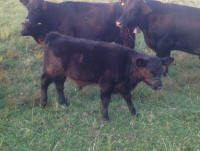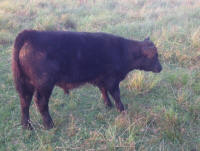-
Some facts about American Aberdeen cattle (Formally known as Lowline Angus):
The Aberdeen breed is known for calving ease, docility, efficient grass or feed conversion and meat quality.
American Aberdeen’s answer the challenges of both the large scale rancher and the small acreage farmers.
Where did American Aberdeen cattle come from?
American Aberdeen cattle were developed from a herd of 100% Registered Angus, which was established at the Trangie Research Center in New South Wales Australia in 1929 to provide quality beef breeding stock for the New South Wales industry. From that early beginning and after decades of selection to moderate frame size came this exciting beef breed we call American Aberdeen cattle. Animal Scientists began with a herd of registered Champion Angus cattle, purchased in 1929, that were carefully selected for high quality and small size. The end result was a breed of small, black, polled cattle with pure Angus genetics.
What size are they?
Mature American Aberdeen bulls will generally fall into a range of 40-48 inches measured at the shoulder and weigh from 900-1500 pounds. Mature cows should measure from 38-46 inches and weigh between 700-1100 pounds. Certain individuals will fall outside of these parameters. Judgment should be made on quality and conformation rather than size.
Do they calve easily?
Yes, due to the smaller size of a newborn calf, assistance is not generally required at calving time and American Aberdeen cows make excellent mothers.
Do American Aberdeen cattle require special handling facilities?
No, they don’t require expensive handling facilities. Being naturally polled and docile, they make for easier handling. They are an excellent choice for those just getting started in the cattle business.
Do they have special feed requirements or environmental limitations?
American Aberdeen cattle thrive on smaller amounts of feed, whether grass or hay because of their efficient conversion of grass to meat. American Aberdeen cattle require limited amount of feed and this makes them ideal for smaller acreage and allows for more American Aberdeen’s to be stocked in the same area that would support traditional cattle. Rotational grazing more numbers of smaller animals on a property creates more hoof action that is beneficial to implanting seeds to reestablish grasses and legumes in sensitive areas. This makes American Aberdeen cattle a better choice for riparian areas as well as arid or sandy soils. Being of true Angus, they adapt well to all weather conditions and climates as is demonstrated by the wide variety of American Aberdeen Association members located in different areas of the country.
What impact can American Aberdeen cattle make in the commercial industry?
Given their feed requirements for a commercial operation there are less inputs, higher stocking rates and more rib eye area per 100 pounds of carcass weight.
What are the benefits of American Aberdeen cattle?
American Aberdeen cattle are easy calving, good natured cattle that are very feed efficient and maintain themselves on grass. They have excellent taste, texture and tenderness beef characteristics and exceptional ribeye area per hundred pounds of body weight which translates to very high yielding, high quality, high value beef carcasses.
American Aberdeen cattle answer the challenges of both the large scale rancher and the small acreage farmers.
For the large scale ranch operation, American Aberdeen lower labor and veterinary costs and provide many economic advantages. Commercial heifers bred to Fullblood American Aberdeen bulls calve easily and breed back quickly, reducing the calving interval. Halfblood American Aberdeen cows maintain themselves on about half the feed that is required by a full size crossbred cow and wean more pounds of calf per acre.
American Aberdeen cattle are also a perfect choice for small acreage farmers. Their moderate size makes them easy to handle and minimizes equipment requirements. Their feed efficiency improves the carrying capacity of a farm. They produce exceptional quality beef. They are ideal show animals for 4-H and other youth projects bringing in the next generation of cattle people. They may also offer the tax advantages of an agriculturally based property and business.
American Aberdeen cross cattle are extremely well suited to grass-fed beef production as they are easy fleshing and will finish on a high roughage ration, producing high value carcasses with a minimum of input costs.
A few more facts:
Neil Effertz of Bismarck, N.D., imported the first Aberdeen cattle to the United States in 1996. He had learned of Aberdeen ribeye sizes posted at the largest show in Australia, and did his own study of breed comparisons.
“The cattle had a 30 percent larger ribeye per hundred weight than typical Angus. When I first went to Australia and saw that they were getting considerably more beef production per acre than bigger cattle, it just made sense to me since the No. 1 variable cost in ranching is maintenance and feed,” he said.
“Aberdeen cattle are like the 1960-model Angus cattle your grandfather had,” Oklahoma cowman Kirk Duff described. “They have the same heritage as Angus and retain the polled genetics in a good-uddered, fertile cow in a more moderately framed, more efficient package with greater longevity,” Duff added.
Numerous studies have shown that a 1,200-lb. cow is more efficient, Duff said. “It flat doesn’t take as much energy in terms of grass, feed or hay because Aberdeen’s convert feed more efficiently. They maintain body condition score on grass and they achieve finish with less days on feed.”
“Aberdeen cattle are incredibly low input cost cattle,” he said. “We don’t treat for scours or pneumonia anymore. When you take the expense out of vaccines, treating sick calves and death loss, it takes much of the work and expense out of the cattle business.”
Calving ease is a primary attribute of Aberdeen cattle.
Beyond ranch profitability, Aberdeen cattle also have maintained the tender, flavorful beef of the original Angus genetics.
Aberdeen cattle are rugged, hardy, low-input cattle that were the foundation of the Angus breed
Aberdeen cattle in the United States descend from a closed herd formed at the Trangie Research Centre in New South Wales, Australia, in 1929. The foundation stock was purchased from Canada’s historic Glencarnock Estate that bred the leading genetics of that time.
Personal experience:
Having worked with cross-bred cattle, Longhorns, and Corrientes for years, I find it especially enjoyable working with this docile breed. Since I got my first Aberdeen Angus, I have experienced no more than a few who ever even kicked while being worked on – a sharp contrast to any other breed I’ve owned. They are extremely easy to work with for tagging, castrating, and other such needs. They are not fence pushers and are very easy to contain; are quiet and personable.
In the ten years I’ve had this breed I have never had to assist a birth, have never lost one to calving, and have never had a poor mother – regardless of her age or size.
These cattle require the barest minimum of care and attention.
They are certainly the right cattle for me. Maybe they are for you, too.
For even more information on this breed, visit “Contact us – American Aberdeen” on the web.
To contact Everwind, please email joan@everwind.com or call Joan at 814-434-4580.
Everwind Ranch
Joan Wurst
15871 Sturgis Road
Union City, PA 16438
814-434-4580
EMAIL
© 2019 Joan E. Wurst & Everwind Ranch. All rights reserved.
Updated 11/01/2023
Web Maintained by: Laurie Whitling
Site hosted by: 1&1 Web Hosting Services and Domain Name Registration

